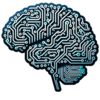
Back موسیقی و هوش مصنوعی Persian Glazba i umjetna inteligencija Croatian Արհեստական բանականություն և երաժշտություն Armenian Musica e intelligenza artificiale Italian Música e inteligência artificial Portuguese Искусственный интеллект в музыке Russian 音乐和人工智能 Chinese
| Part of a series on |
| Artificial intelligence |
|---|
Music and artificial intelligence (music and AI) is the development of music software programs which use AI to generate music.[1] As with applications in other fields, AI in music also simulates mental tasks. A prominent feature is the capability of an AI algorithm to learn based on past data, such as in computer accompaniment technology, wherein the AI is capable of listening to a human performer and performing accompaniment.[2] Artificial intelligence also drives interactive composition technology, wherein a computer composes music in response to a live performance. There are other AI applications in music that cover not only music composition, production, and performance but also how music is marketed and consumed. Several music player programs have also been developed to use voice recognition and natural language processing technology for music voice control. Current research includes the application of AI in music composition, performance, theory and digital sound processing.
Erwin Panofksy proposed that in all art, there existed three levels of meaning: primary meaning, or the natural subject; secondary meaning, or the conventional subject; and tertiary meaning, the intrinsic content of the subject.[3][4] AI music explores the foremost of these, creating music without the "intention" which is usually behind it, leaving composers who listen to machine-generated pieces feeling unsettled by the lack of apparent meaning.[5]
- ^ D. Herremans; C.H.; Chuan, E. Chew (2017). "A Functional Taxonomy of Music Generation Systems". ACM Computing Surveys. 50 (5): 69:1–30. arXiv:1812.04186. doi:10.1145/3108242. S2CID 3483927.
- ^ Dannenberg, Roger. "Artificial Intelligence, Machine Learning, and Music Understanding" (PDF). Semantic Scholar. S2CID 17787070. Archived from the original (PDF) on 23 August 2018. Retrieved 23 August 2018.
- ^ Erwin Panofsky, Studies in Iconology: Humanistic Themes in the Art of the Renaissance. Oxford 1939.
- ^ Dilly, Heinrich (2020), Arnold, Heinz Ludwig (ed.), "Panofsky, Erwin: Zum Problem der Beschreibung und Inhaltsdeutung von Werken der bildenden Kunst", Kindlers Literatur Lexikon (KLL) (in German), Stuttgart: J.B. Metzler, pp. 1–2, doi:10.1007/978-3-476-05728-0_16027-1, ISBN 978-3-476-05728-0, retrieved 3 March 2024
- ^ Miranda, Eduardo Reck, ed. (2021). "Handbook of Artificial Intelligence for Music". SpringerLink. doi:10.1007/978-3-030-72116-9. ISBN 978-3-030-72115-2.
